 What are Funding Development Briefings?
What are Funding Development Briefings?
Funding Development Briefing 01/02/23 Spotlight on: KTPs – with Business Engagement and Knowledge Exchange Managers_re-scheduled!
 What are Funding Development Briefings?
What are Funding Development Briefings?
Latest research and knowledge exchange news at Bournemouth University
 What are Funding Development Briefings?
What are Funding Development Briefings?
 InnovateUK have announced the opening of the Innovation in health and life sciences, round 3. All projects must be led by a business and have the involvement of at least one SME on the project. Research organisations may participate in applications as collaborators. All submissions must demonstrate plans for significant innovation in at least one of the priority areas:
InnovateUK have announced the opening of the Innovation in health and life sciences, round 3. All projects must be led by a business and have the involvement of at least one SME on the project. Research organisations may participate in applications as collaborators. All submissions must demonstrate plans for significant innovation in at least one of the priority areas:
Applications will also need to address at least one of the competition themes. Applications for Knowledge Transfer Partnerships are also welcome. Total project costs should be between £50k and £2m and last from six months to three years.
For information on Knowledge Transfer Partnerships, please contact Rachel Clarke (clarker@bournemouth.ac.uk). For discussing how to developing a research collaboration with industry, please contact Ehren Milner (emilner@bournemouth.ac.uk).

It is estimated that some 30% of airline engines worldwide are analysed using PA’s current-generation technologies to detect fan blade defects
A team from the Faculty of Science and Technology, led Professor Siamak Noroozi and Dr Richard Gunstone, have successfully obtained a Grant Offer Letter (GOL) for a high-impact KTP working with Precision Acoustics Limited (Dorset).
In this blog post we discuss some of the background to this KTP, and objectives.
Precision Acoustics (PA) manufactures acoustic measurement products for the medical and Non Destructive Testing (NDT) industries and is well established as a major supplier of equipment for the (MHz) ultrasound markets world-wide. PA has a close working relationship with the National Physical Laboratory, London, and academic establishments across the UK to further R&D.
The company’s core products are acoustics measuring devices. The company already has a significant share of the world market in this area, and is now embarking on innovative industrial NDT systems working on a number of precursor projects including with Rolls Royce. The longer term objective can only be achieved if PA introduces a software capability able to devise, maintain and develop a development process that has the expected attributes of resilience, performance and integrity, supporting product deployment. This is the principal focus for the KTP, capitalising on the capability in systems design, software, and assurance within BU.
The diagnostic systems work at PA are being developed and used in numerous applications, including malaria detection. It is estimated that some 30% of commercial airliners globally use the technologies developed by PAL for analysing defects in engine fan blades, for example. Due to the inherent nature of NDT systems and the potential application areas, these application areas are likely to have societal relevance and high-impact.
A great deal of effort has been spent in designing the project to be flexible and comprehensive. This has been made possible by the capable contribution of Norman Stock, the Faculty Business Relations Officer. He has worked closely with the academic staff and also the company to present a suitable proposal to Innovate UK, who are part-funding the collaboration.
In terms of project design, the KTP incorporates the new “KTP laydown” of an integrated MRes opportunity for the Associate, combined with expectations of research activity leading to co-authored papers. This provides a route for knowledge transfer of expertise from the university to the company, in a way that delivers advantages for all stakeholders.
We look forward to providing further reports on our collaboration with PA as time progresses.
In terms of advice for others considering KTP funding, Richard highlights a few relevant points:
“Engage early with the Business Relations Officer for your Faculty. Make sure deadlines are adhered to, including submission windows with Innovate UK. Finally, clarify the project plan as early as possible, including what is achievable in the project timescale – scoping is key”

While many have been enjoying the last of the great British summer, the KEIT team have been working hard to ensure that BU’s research and knowledge is informed by society for the benefit of society on a number of cross institutional projects. Read on for a selection of our achievements this month:
Communicating BU’s research
Two exciting new digital features have been launched this month. The Research Photo of the Week exhibits winning photographs from the Research Photography Competition that we held earlier this year to showcase BU research. Our research spotlight feature has also just been launched in the form of a short video interview, featuring Dr Sally Reynolds whose work has recently been published in Scientific Reports.
Other research communication successes include Colin Pritchard’s research into dementia which was featured on the front page of the Times in August and has been well cited in the local and national press. Additionally, Jane Murphy and Joanne Holmes’ research into dementia and nutrition was reported in the Mirror and subsequently in the Coventry Telegraph and Evening Gazette.
Public Engagement
After the success of the Festival of Learning back in July, we’re already moving onto our next big event of the year, the ESRC Festival of Social Science. BU has supported events as part of the Festival for the past 3 years but this year, for the first time, we are officially a partner of the Festival and as such are producing many more events for the public, business and schools. Take a look at research.bournemouth.ac.uk/events for further details of activities taking place as part of the Festival, as well as for details of all our public facing activity.
Café Scientifique continues to be successful with September’s talk coming from Dr Robin Wilson from University of Southampton who discussed how we’re monitoring our environment from space and why we should care about it. Upcoming talks will feature Marine Archaeologist, Tom Cousins (October 6) and Vanora Hundley and Edwin Van Teijlingen who will explore Fear in Childbirth (November). If you’d like to be involved and have a great idea for a debate-centric talk we’d love to hear from you – just email Naomi.
The deadline for submitting your expression of interest to run a Festival of Learning event is also fast approaching so be sure to put your name and the concept of your event in online before 25 September.
Higher Education Initiative Fund (HEIF)
13 HEIF projects came to an end this summer, with some excellent outcomes including:
HEIF 5+1: The twelve new projects that secured funding in August 2015 and will run for the next 12 months are well underway. More information will be posted on the Research Blog as these evolve – so keep an eye out for updates. One of the first to go live is Building Roman Britain.
KEIT and Liam Toms within the Media & Communication Faculty are working together to co-ordinate a Creative Bournemouth event to be held at the EBC on 23 September. Professor Tim McIntyre-Bhatty will open the event and a number of speakers from the creative industries will present during the afternoon. This event will also launcha special feature on creative industires in Bournemouth published by The Drum .
Knowledge Transfer Partnerships (KTP)
We currently have five live KTP within SciTech and KTP activity at BU is on the increase with KTP leads associated with every Faculty. This is a fantastic result and we are keen to further promote the specific KTP Cyber Security call and Stratified Medicine call, both of which are due to close in early 2016.
If you’re feeling inspired by our blog post and would like to get involved with some of our projects then feel free to get in touch:
Genna West – Knowledge Exchange and Impact Manager
Rachel Bowen – Research Communications Manager
Rachel Clarke – Knowledge Exchange Adviser (KTP)
Jayne Codling – Knowledge Exchange Adviser
Naomi Kay – Public Engagement Officer
Katie Breadmore – Public Engagement Event’s Organiser
Oliver Cooke – Student Engagement Coordinator
To find out more about us and what we do, take a look at our team page.
 This summer the Knowledge Exchange and Impact Team have been working hard and we have a few successes we’re especially proud of that we’d like to share with you!
This summer the Knowledge Exchange and Impact Team have been working hard and we have a few successes we’re especially proud of that we’d like to share with you!
Festival of Learning
The Festival of Learning took place from the 11th-17th July and featured over 200 activities. The entire of KEIT where heavily involved in making sure this was successful and feedback so far has been fantastically positive. We hope to have some final statistics on numbers and dates for 2016 with you soon. We’re already looking for expressions of interest to be involved in 2016 so if you would like to take part next year then take a look at how to submit your event idea here. If you’re awaiting feedback on your Festival of Learning event then rest assured we’ve been beavering away entering evaluation form data for the past month and you can expect this shortly.
Higher Education Initiative Fund (HEIF)
As HEIF 5 funding came to an end at the end of July after a run of 4 years, there is no time to stop for breath as the wheels of knowledge exchange continue to turn and HEIF 5+1 gears up – running from 1st August 2015 until 31st July 2016. Following a competitive call , twelve projects have been identified to accelerate the ethos of knowledge exchange and innovation at BU. These stem from all faculties and you can follow their progress on the research blog all year. A list of these projects has been included at the bottom of this post and you can email Jayne for further information.
Impact
An impact acceleration plan for the institution will shortly be confirmed and an impact working group convened in September in preparation for REF2020.
Knowledge Exchange and KTP
Both Rachel Clarke and Jayne Codling have been busy flying the BU flag #BUProud amongst our business community, representing the university at internal and external events. These have included supporting business focussed presentations at the Festival of Learning, attendance at the inaugural Festival of Enterprise and networking at a breakfast briefing with the British Interactive Media Association and creative lovies! Rachel also represented RKEO at an event Athelhampton House – organised by Business Insider (a business news publisher). An inaugural academic and industry networking dinner took place early July at the Marriott, between invited guests. This has enhanced links to support an engineering based student project, developing relationships to support social enterprise and environmental solutions in the area of mining, a site visit for academics to a local technology outsourcing company , development of a simulation platform in the drilling industry and additional follow up meetings and collaborations are developing. We also have recently had a KTP awarded which brings us up to a total of five KTP.
Staff Changes
We bid goodbye to Harry Gibson (Event Coordinator) and Sam Squelch (Student Engagement Coordinator) at the end of July as they completed their placement year with us and return to their studies in the Faculty of Management. Their positions have been taken over by Katie Breadmore and Oliver Cooke respectively and you can find out more about both them and their roles here.
Additionally Rebecca Edwards will be temporarily leaving us as she goes on maternity leave on 30th September and Genna West will be covering her time away, coming into post as of 1st September.
If you’re feeling inspired by our blog post and would like to get involved with some of our projects then feel free to get in touch:
Rebecca Edwards – Knowledge Exchange and Impact Manager
Rachel Bowen – Research Communications Manager
Rachel Clarke – Knowledge Exchange Adviser (KTP)
Jayne Codling – Knowledge Exchange Adviser
Naomi Kay – Public Engagement Officer
Katie Breadmore – Public Engagement Event’s Organiser
Oliver Cooke – Student Engagement Coordinator
To find out more about us and what we do, take a look at our team page.
HEIF 5+1 awarded projects
I have recently joined the Research and Knowledge Exchange Office as Knowledge Transfer Partnerships (KTP) Officer, after nearly 4 years working in the Bournemouth University Careers and Employability Service. This is a new role and is dedicated to working with BU academics and industry to promote KTPs and as such develop and manage the University’s KTP portfolio.
What are KTPs?
A KTP is part-funded by the government and the aim of this scheme is to encourage collaboration on projects between businesses and academics. KTPs had previously been called the Teaching Company Scheme, which you may have heard of, however a rebrand a decade ago saw the TCS become a KTP. KTPs are managed by the Technology Strategy Board (TSB) and provide benefits to all parties involved – this scheme offers a fusion of academic and industry collaboration supported by an associate (graduate).
What’s in it for you?
KTPs are an excellent way of bringing in income and developing knowledge exchange with a clear pathway to impact.
Key benefits are as follows:
KTPs are valuable to business as they provide a distinct transfer of knowledge to an innovative project which is set to add significant value to a business.
Bournemouth University has run various KTPs over the years, the following case studies document how good the KTP has been of benefit to each party (Academic Partner, Company and Associate).
These include:
Further case studies and information on KTPs can be found on the KTP website.
If you would like to discuss any KTP ideas you would like to develop or chat about any aspect of KTPs, please do contact me on 01202 961347 or email clarker@bournemouth.ac.uk
 The AHRC has committed to ensuring that the research it funds can be properly exploited and applied in areas where it can make a difference. In particular, the AHRC’s new delivery plan puts KE, external engagement, collaboration, partnership working, public and policy engagement and impact at the very heart of all that it does.
The AHRC has committed to ensuring that the research it funds can be properly exploited and applied in areas where it can make a difference. In particular, the AHRC’s new delivery plan puts KE, external engagement, collaboration, partnership working, public and policy engagement and impact at the very heart of all that it does.
The AHRC has made a huge investment of £20m fEC to establish four ‘Knowledge Exchange Hubs for the Creative Economy’ over the next 4 years. The purpose of these hubs will be to build new partnerships and entrepreneurial capacity in the ‘Creative Economy’ and in addition increase the number of arts and humanities researchers actively engaged in research-based knowledge exchange.
Take advantage of this investment and look at how you can engage with the creative economy; perhaps through a Knowledge Transfer Partnership (KTP)? An excellent example of knowledge exchange, KTPs are run by the Technology Strategy Board and are co-funded by a range of bodies such as the AHRC.
KTPs provide academics with the opportunity to:
Why not consider the benefits of knowledge exchange and use your research to move forward in building partnerships and entrepreneurial capacity in the creative economy……
Dr Celia Beckett, Knowledge Transfer Partnership (KTP) research associate at BU and Five Rivers Child Care Ltd attended 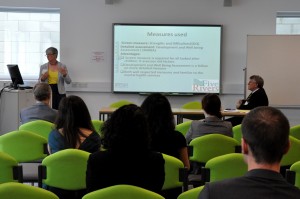 the KTP Associates’ Conference at Brighton University on 13th June. She presented a paper on the pilot stage of her project “Improving the care of children in residential units: assessment and interventions”. The conference, which is a Brighton University initiative supported by the Centre for Collaboration and Partnership, was well attended and there were 10 paper presentations and 8 posters. Topics ranged from roller blinds to leak repair additives for coolant systems! A recurring theme at the conference was the role of the KTP in working to effect change in organisations that result in improved commercial outcomes as well as the challenges and rewards of this role.
the KTP Associates’ Conference at Brighton University on 13th June. She presented a paper on the pilot stage of her project “Improving the care of children in residential units: assessment and interventions”. The conference, which is a Brighton University initiative supported by the Centre for Collaboration and Partnership, was well attended and there were 10 paper presentations and 8 posters. Topics ranged from roller blinds to leak repair additives for coolant systems! A recurring theme at the conference was the role of the KTP in working to effect change in organisations that result in improved commercial outcomes as well as the challenges and rewards of this role.
There are c. 800 KTP associates currently working on projects throughout the UK, ensuring that there is an exchange of knowledge between Universities and private / public companies, making a real difference to all those organisations involved in KTPs. It is one of the largest graduate schemes in the UK. More information about BU’s KTPs can be found at the newly relaunched Business Pages.
Celia will also be presenting a poster at the forthcoming Recovery-focused conference: Engagement in Life: Promoting Wellbeing and Mental Health, hosted by BU on 6th September 2013.
There are a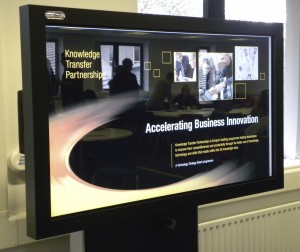 variety of funded initiatives on offer to help businesses develop and grow, but many are not aware of these offers, or just how much BU can help them with their development.
variety of funded initiatives on offer to help businesses develop and grow, but many are not aware of these offers, or just how much BU can help them with their development.
This is why we felt it was important to organise the recent KTP and SMART award events, to help promote and encourage businesses to take advantage of the expertise BU has to offer.
Both events were well attended by businesses and academics wanting to find out more on Knowledge Transfer Partnerships, SMART Awards and Innovation Vouchers. The feedback was extremely positive from all those who attended, and as a result a number of meetings have been arranged with businesses who are keen to 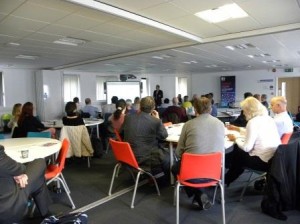 discuss how BU can help them develop!
discuss how BU can help them develop!
It was fantastic to receive such positive feedback; one business owner was particularly impressed and commented:
“I go to quite a few so called “Business Events” that serve little purpose, so I approached today’s event at BU a little circumspect. Now I can say that this morning I have attended the best business focused event in my recent experience. Extremely informative, very professionally managed and a great breakfast. A big thank you for showing the way that Academia and business can and should complement each other.”
Roger Allen – Managing Director, Zeta Commerce Ltd
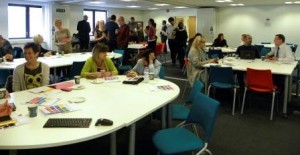
Should you wish to find out more on how businesses can benefit from any of the funded initiatives spoken about at the events, please contact Lucy Rossiter, email or call 01202 961215.
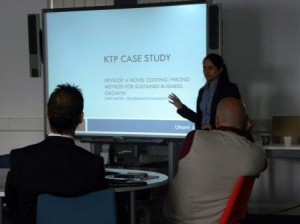
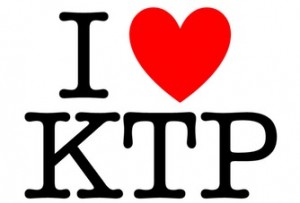 Although KTPs have been around for over 30 years; for some academics they are still new territory! Bearing this in mind, it was suggested that a training session on KTPs would be welcomed by academics in the School of DEC.
Although KTPs have been around for over 30 years; for some academics they are still new territory! Bearing this in mind, it was suggested that a training session on KTPs would be welcomed by academics in the School of DEC.
The training session took place at the Talbot Campus last week, and was well received – especially as the session provided the opportunity to meet Neil Grice who is the KTP Advisor for the region. KTP Advisors play a key role in the setting up of KTPs – they have a broad range of industrial expertise and are on hand to help with the preparation of a KTP proposal. Then, throughout the life cycle of the KTP, they monitor the progress to ensure that all the partners achieve their goals.
Neil provided an excellent and engaging overview of KTPs, and in addition to his presentation, further project information was delivered by BU colleagues, Emily Cieciura and Norman Stock. They both did a fantastic job of explaining the particulars in bidding for KTPs and what is required post award. The technicalities of a KTP can be quite laborious, so credit goes to Neil, Emily and Norman for delivering a training session which was clear and straightforward!
If you feel you or your school would benefit from a KTP training session, please get in touch! KTP’s are an excellent opportunity for academics to engage with further Research and Development, and in particular they contribute to the REF. Taking this into consideration, why not take advantage of a training session and find out the value of KTPs?
To find out further information, or to arrange a training session, please email Lucy Rossiter.
 Do you require further advice or guidance on Knowledge Transfer Partnerships (KTP) or other funding initiatives such as Innovation Vouchers? Well, hopefully I can be of help!
Do you require further advice or guidance on Knowledge Transfer Partnerships (KTP) or other funding initiatives such as Innovation Vouchers? Well, hopefully I can be of help!
My name is Lucy Rossiter and I have recently started working at BU – I am the new Knowledge Exchange Officer within the Research and Knowledge Exchange Development team. My focus will be on promoting and marketing BU expertise and services to external organisations to secure new business for the university.
Perhaps you have links with organisations that would benefit from a KTP or use of an Innovation Voucher? If so, I will happily engage with the organisation and offer necessary guidance, or I can help develop any project ideas which you may have.
Over the coming weeks I will post further information on the benefits of KTP’s and Innovation Vouchers, but in the meantime please get in touch if you require any help or guidance regarding these funding initiatives.
Please contact me by email , or should you wish to meet – I am based in Melbury House on the 4th Floor in the R&KE office.
I will look forward to working with you!
Now is the time to find out if your area of research interest can be applied in the work-place with the assistance of a government grant.
with the assistance of a government grant.
The Technology Strategy Board has just released figures from their recent Knowledge Transfer Partnership approvals meeting. In May 2012, 42 classic KTP proposals were submitted with 34 being supported. That is an 81% success rate. Only 12 Shorter KTPs were submitted, with 10 of these being supported. This gives an excellent 83% success rate. They are looking for over 100 per approval meeting. Consequently, the Technology Strategy Board is very keen to see more quality applications.
So, if you are thinking of engaging with the technology exchange process, now would be a good time to make the most of your industry contacts. The TSB offers support throughout the process via their KTP Advisors. You do not always need to submit a full proposal at the outset but can use an Expression of Interest application to ‘test the water’.
For those of you not familiar with KTPs, Classic KTPs are normally between 12 and 36 months and are broadly strategic in their outcomes. Shorter KTPs are between 26 to 51 weeks and have more tactical outcomes. Both employ a recent graduate as the project associate, supported by the company and academic supervisors, to complete a specific company-based project. For more detailed information on this successful and long-running funding scheme, please go to the KTP website or just search for ‘KTP’. There are resources specific to the needs of the academic, the company and the associate. Check out _connect and join one of the Knowledge Transfer Networks.
There is also help within BU. Peter Delgado (BU’s Commercialisation and KTP Officer) should be your first port of call (pdelgado@bournemouth.ac.uk or 01202 961215). In addition, if you are visiting a company and think that a KTP might be just what they need, KTP marketing materials are available from Emily Cieciura (ecieciura@bournemouth.ac.uk or 01202 968241).
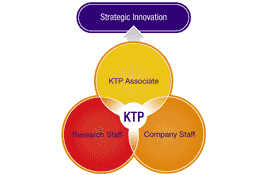 The AHRC has announced that it will support Knowledge Transfer Partnership (KTP) projects in which knowledge, skills and/or technology/technologies arising from arts and humanities research are transferred to businesses and other sectors within the UK. These can range from commercial to, not for profit, charity, and publicly funded organisations.
The AHRC has announced that it will support Knowledge Transfer Partnership (KTP) projects in which knowledge, skills and/or technology/technologies arising from arts and humanities research are transferred to businesses and other sectors within the UK. These can range from commercial to, not for profit, charity, and publicly funded organisations.
Project subjects which qualify for funding consideration include law, archaeology, journalism, and media and communication studies, artistic design and media.
The funding is focussed on meeting the needs of small/medium sized organisations.
A KTP project can last from 26 weeks to 3 years. The funding pays for a full time post-graduate and 1/2 a day per week of an academic supervisor’s time. Projects need to be co-funded by an organisation from any of the sectors listed above. For small/medium sized organisations their contribution to the funding costs is approximately £308 per week.
If you require any further information on this post or KTPs in general please contact Peter Delgado, Commercialisation and KTP Officer, e-mail – pdelgado@bournemouth.ac.uk
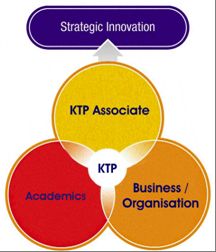 The Technology Strategy Board has made some revisions to the criteria a project has to meet in order to receive a Knowledge Transfer Partnership (KTP) grant. This has caused some confusion. In order to obtain clarification, Neil Grice, the local Adviser visited the University last week for a meeting with School representatives.
The Technology Strategy Board has made some revisions to the criteria a project has to meet in order to receive a Knowledge Transfer Partnership (KTP) grant. This has caused some confusion. In order to obtain clarification, Neil Grice, the local Adviser visited the University last week for a meeting with School representatives.
Listed below are the current key award criteria:
If you require any further information on KTPs in general please contact Peter Delgado, Commercialisation and KTP Officer, e-mail – pdelgado@bournemouth.ac.uk
 Established in 1975, Knowledge Transfer Partnerships (KTP) is one of the world’s leading knowledge transfer mechanisms, which provides academics with the unique opportunity to apply their knowledge and expertise to important problems facing businesses. The programme provides Government grants to fund joint projects with business or third sector organisations lasting from 6 months to 3 years.
Established in 1975, Knowledge Transfer Partnerships (KTP) is one of the world’s leading knowledge transfer mechanisms, which provides academics with the unique opportunity to apply their knowledge and expertise to important problems facing businesses. The programme provides Government grants to fund joint projects with business or third sector organisations lasting from 6 months to 3 years.
Following the Government’s Comprehensive Spending Review, the budget for new KTPs was reduced to £25m per annum. While this is sufficient to fund between 600 and 800 KTPs per annum, the Technology Strategy Board (TSB) is seeking other ways of funding additional KTPs. At a meeting between a number of universities, including Bournemouth University, and the TSB held on the 17th January, Debbie Buckley-Golder, the TSB’s Head of Knowledge Exchange said this additional funding is being sought from major charities and industry. While the £25m core funding will continue to be available on an any time, any topic basis, the new funding is likely to be targeted at particular subject areas with set response timescales. Subject areas will driven by business needs and are likely to be published in March 2012.
The current success rates for KTP applications is above 80%, however, the grant rate for multiple KTPs from the same company is likely to be reduced. Due to the significantly larger impact, most KTPs (75%) will be granted for projects with Small Medium Enterprises (SMEs). However, to facilitate the continued involvement of large organisations, the TSB are investigating a reduced grant rate KTP where the organisation will fund most of the project but continue to receive support from the TSB, for example KTP Advisers and associate training.
Bournemouth University has been very successful in assisting businesses through the KTP programme, see article on this link.
If you require any further information on this meeting or KTPs in general please contact Peter Delgado, Commercialisation and KTP Officer, e-mail Peter Delgado.
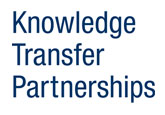 Following the Comprehensive Spending Review of 2010, the Technology Strategy Board was hit hard, as were many government departments and their initiatives. The December 2011 KTP Conference, however, shows that the climate for KTPs is improving and that BU is in a position to benefit from this optimism.
Following the Comprehensive Spending Review of 2010, the Technology Strategy Board was hit hard, as were many government departments and their initiatives. The December 2011 KTP Conference, however, shows that the climate for KTPs is improving and that BU is in a position to benefit from this optimism.
Highlights from the conference were:
For more information on KTPs, please go to the KTP website or at BU contact David Kilburn (dkilburn@bournemouth.ac.uk)
The Technology Strategy Board, which delivers the Knowledge Transfer Partnership scheme, has announced:
As the TSB releases more information on KTP scheme, I will be posting this on the blog, so watch out for more news.
Please contact me if you have any queries about current or future KTPs, in the first instance. Further information is also available on the KTP website. For those interested in developing KTPs and networking with others with the same interests, the TSB recommends that you join the Knowledge Transfer Network.
Emily Cieciura (Research & Knowledge Exchange Operations)
ecieciura@bournemouth.ac.uk or 01202 968241
 You are invited to contribute and participate in a Workshop on Meta Transfer of Knowledge – Challenges in Transfer of Knowledge in Industry.
You are invited to contribute and participate in a Workshop on Meta Transfer of Knowledge – Challenges in Transfer of Knowledge in Industry.
The workshop is taking place at the International Conference on Innovation through Knowledge Transfer at BU on 19th and 20th of April 2012.
The workshop is a part of Knowledge Transfer activities that take place within the EU funded INFER project coordinated by Prof. Bogdan Gabrys, DEC. INFER offers participants the opportunity to move between sectors and country in order to provide, absorb and implement new knowledge in a professional industrial-academic environment.
The workshop will allow conference delegates to benefit from experiences in knowledge transfer, knowledge exchange and knowledge sharing, during the progress of the INFER and other similar projects.
The goal of the workshop is to share the knowledge about the most effective transfer of knowledge activities that can and have been organised especially in large international projects such as those carried out within EC “People” Industry-Academia Partnerships and Pathways (IAPP) programme.
 Such projects are of particular interest to this workshop as their aim is to stimulate intersectoral mobility and increase knowledge sharing through joint research partnerships in longer term co-operation programmes between organisations from academia and industry where effective knowledge transfer is critical to the success of the projects.
Such projects are of particular interest to this workshop as their aim is to stimulate intersectoral mobility and increase knowledge sharing through joint research partnerships in longer term co-operation programmes between organisations from academia and industry where effective knowledge transfer is critical to the success of the projects.
As the transfer of knowledge mechanisms can be observed in all areas where the cooperation between academia and industry exists, it is hoped that sustainable collaborations between people who are interested in continuous development of these mechanisms and improvement of their efficiency will be fostered. This will give the opportunity to push further the discussion upon the potential of Transfer of Knowledge phenomena across different communities.
More about this event can be found on the project website and if you have any further questions about the Workshop please contact Katarzyna Musial.